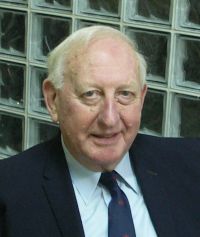 Over 50 years ago, Julian Slatterie's mantra, as he sought to calm the chaos created by 250 seven-to-12-year olds in the junior school assembly at St Aloysius College, was always the same: 'Gentlemen, I've had just about as much as I can take of that behaviour.'
Over 50 years ago, Julian Slatterie's mantra, as he sought to calm the chaos created by 250 seven-to-12-year olds in the junior school assembly at St Aloysius College, was always the same: 'Gentlemen, I've had just about as much as I can take of that behaviour.'
I used to hear the same script over the megaphone at Burke Hall in the 1970s, when I was at university and living next door at Campion College. I imagine he also used it at Kostka Hall in the 1980s and '90s. Julian was a man of settled and stable habits.
His patrician, world-weary style was used to great effect as a disciplinary device with boys, but also more widely in his life. It masked his essential shyness. But it couldn't hide what a thoroughly professional, perceptive, loyal and faith-filled person he was in his responsiveness to all that his Jesuit life asked of him.
Julian died suddenly of a heart attack on Tuesday 20 May. For the last 18 months, he had repeated problems with broken bones — ankles, a hip replacement, a knee reconstruction and shoulder replacement. These required pins, stents, general anesthetics and rehabilitation, all of which weakened his heart. But they also presaged a future of pain and immobility even if the operations worked and he survived the gruelling regime of medical procedures in a relatively short space of time.
Others are far better qualified than I am to give an account of Julian's life as a teacher and school administrator, for over four decades in six Jesuit institutions — Riverview, St Aloysius, the now defunct St Patrick's College, East Melbourne, and the three campuses of Xavier College in Melbourne. But Julian had another life, which it was my privilege and good fortune to share with him.
Julian was the antithesis of a self-promoter. However, his contribution to apostolic effectiveness — through his management and oversight of the Jesuits' finances, investments and expenditures on various initiatives, some of which he had well founded doubts about — might not be widely known and appreciated for the indispensable contribution it made to their success.
Julian had a degree in Commerce from Melbourne University and, coming from a family whose professional expertise was in insurance, he was adept with finance. For over two decades, he was the Jesuits' treasurer. He managed the stocks and shares, property purchases and disposals, and building and construction projects.
He provided the funds for a fast changing Jesuit world of diminished Australian manpower and an ageing workforce of Jesuits in the Province, for the training of what recruits the Province had, and for the training of the burgeoning number of young Jesuits in Asia, some of whom came to Australia for their studies. He created the financial resources that provided aged care facilities for a Province, two thirds of which is now over 60.
This work was essential for a Province in numerical decline, whose financial implications he understood well. But there was yet another contribution he made to not allowing the Jesuits to simply disappear into history. He made an indispensable contribution as the 'patient banker' for most of the Province's enterprising initiatives from the 1980s on. While always insisting that apostolates had to become self-supporting as soon as they could, it was Julian who provided the cash flow and budgetary advice until they could.
For more than 25 years, he contributed to the governance and financial underpinning of both Jesuit Social Services and Jesuit Communications. This was because he carried the Province's interest in fostering these innovative initiatives.
While no one, Julian included, would see him as an innovator, he was convinced that the only use for money was to do good. He wanted what he was principally responsible for generating through his management of Province investments to be put to good use in making a difference to people's lives. He wanted money to serve a missionary purpose.
While patient, Julian could be a demanding banker. When, at a planning meeting of Province leaders in 1988, I proposed the initiative that was to become Jesuit Communications, Julian was the first to respond. 'Now Michael,' he said. 'This proposal rests on five assumptions and three presuppositions and if any of them is voided, the project is likely to fail.'
After swallowing and drawing breath, I asked Julian how the assumptions were to be addressed and the presuppositions vindicated. He answered that question with 25 years membership of the board and annual attention to budgeting and allocations from the Province to make up for shortfalls in revenues. The same is true of his engagement over an even longer time with Jesuit Social Services from its infancy in the early 1980s.
But what was probably the biggest risk of all — what became Church Resources — owes its existence to Julian's involvement as an advisor and initial investor. Today, as it has for the last 15 years, Church Resources turns over hundreds of millions of dollars in the sale of commodities at discounted rates for Church institutions — schools and parishes, hospitals and aged care facilities, welfare services and accommodation sites. And it has a record of innovation in its introduction of the web and digital communication to many areas of the Church.
When it was just a good idea, Julian chaired the Board, exploring the idea and financing its exploratory, risk-laden early phase. He made a key contribution to its establishment and thriving.
Despite his apparent haughtiness, a witty and at times self-mocking quip was never far from Julian's lips. He was grounded, honest and had an utterly realistic sense of himself, the Jesuits, the world, and God. Though bored frequently during his annual eight day silent retreat, his unadorned faith was at the core of his being, and was demonstrated in his attentive and patient service to others.
It was a faith that sustained him through the pain and physical infirmities of the last 18 months when he could justifiably say to God what he had said to so many school assemblies — the 'he had had just about as much as he could take of all that, thank you very much'. If this was his prayer, he has had it answered, and he's gone to join many old friends who will be pleased to see him.
 Fr Michael Kelly SJ is executive director of the Bangkok-based UCAN Catholic news agency.
Fr Michael Kelly SJ is executive director of the Bangkok-based UCAN Catholic news agency.